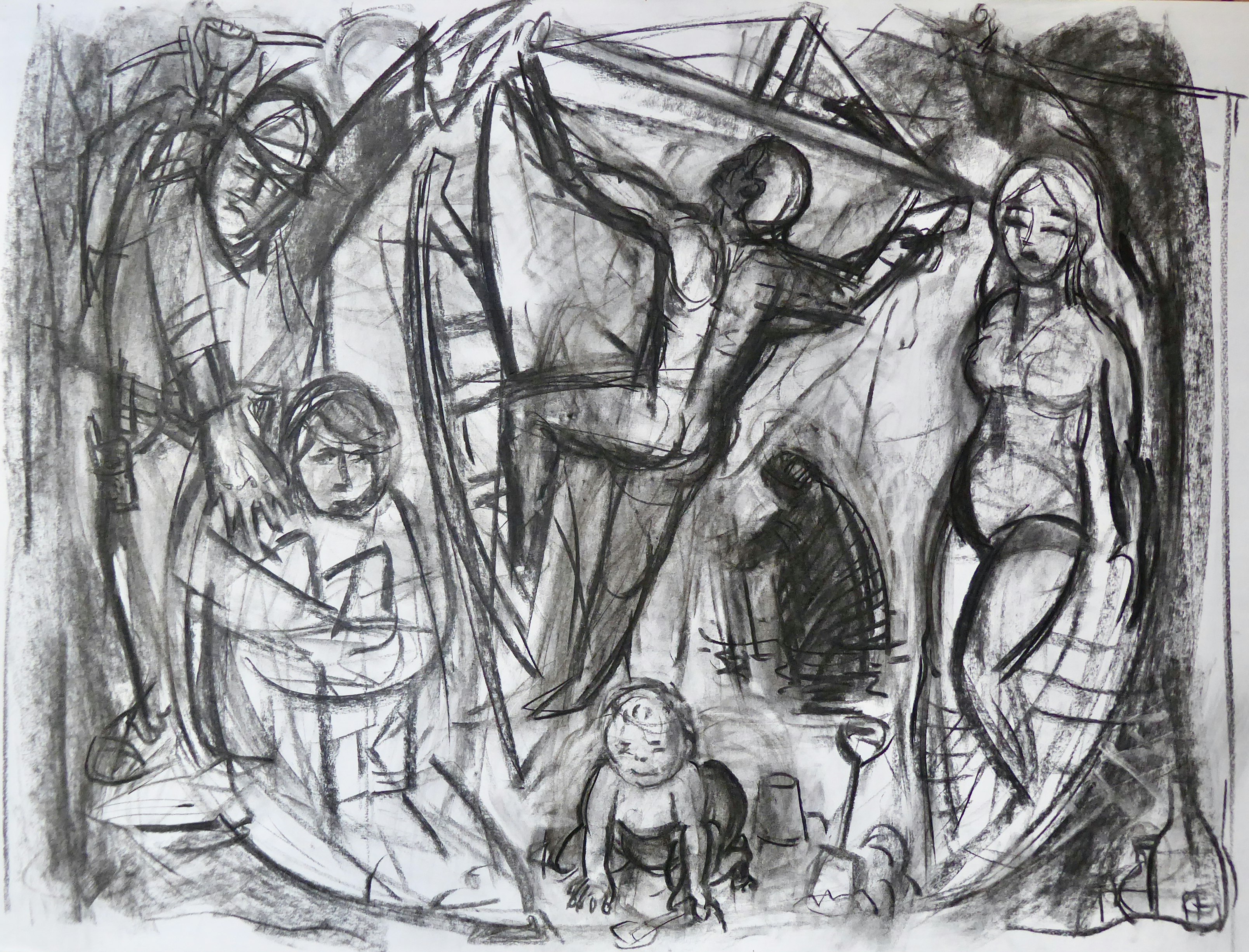The Fisherboy Sets Sail - the narrative text

THE FISHERBOY SETS SAIL
is a visual and text project which is very much a work-in-progress that has been sustained over many years.
see NARRATIVE in the ARTWORKS menu for more images
The story recounts an odyssey (only vaguely related to Homer's) composed of several layers or alternative versions. Featuring a youth, or in one strand, a young couple, escaping home and encountering the world/themselves. Most of the narrative occurs on, or about, the sea (– presumably symbolic of the un- or sub- conscious and therefore peopled with archetypes and symbols.)
Read on below for selected excerpts from the work-in-progress:
PRELUDE: The Northern Harbour
I was getting a crick in my neck. From ducking the bellying walls of old buildings that, white-washed a dazzling white in the strong spring sunshine, lurched close to my head and threw the worn cobble road into murky shade. I nearly missed my footing when my first sight of the harbour sprang into view: a giddying dazzle of ochre-grey quay and sparkling blue blue sea still alarmingly far below me.
I was puffed by the time I reached the small square. Partly because I hadn’t been expecting such warm weather and was over-dressed. My memories of summer on this coast had been of a sun chilled by a steady on-shore North-Sea breeze, and of the the cold white haar rolling in off the sea, blanketing the street-level in fog. Up on the cliffs you could still be in sun, looking down, as if from a plane, on the sunny white top of the cloud below that had erased the known world.
And especially it could be relied on every time Tina and I decided to go to the beach. In it would come, rolling grey and forbidding, damp and sombre.
Well, what do you expect? Tina would say, Its a Calvinist land! Ruled by a heavy Calvinist hand: I know what you twos are up to, reet enough! Cavorting on the sands, we ken what that leads tae! We're no standing for any of that here, thank'ee vee-e-ry much!
I would have been less hot and short of breath if I hadn’t missed the turning for the centre. Instead, I continued straight down towards the harbour, the street becoming cobbled and increasingly steep and narrow. I nearly turned my ankle stepping aside for a door that suddenly opened in front of me. The buildings looked like deliberately distressed sets for a costume drama, but they were lived in. The fishing port was active, busy even, with nets spread out over the quay, piles of crab and lobster pots lining the harbour walls, and masts of small off-shore fishing boats crowding the view. The air was heavy with reassuring sea smells, of fish, of tar and paint, of jute and sisal and other rope fibres.
I found my way back, up hill, to the square, and steadied my self against a wall to get my bearings. To my right, many cobbled alleys lead away between shops and houses. On my left was the cafe. I looked at my watch.
Again.
I thought I was late when I got on the bus. I had meant to catch the one half-an-hour earlier, and was looking at my watch most of the journey, only half taking in the roll of hills, nearly missing the first gleam of sea as we gained the crest, and not giving much attention to the gradual widening and levelling of the fields as the shore neared. Then I realised that, through good luck and certainly by no attention to the timetable, I had managed to get on the direct route that cut out the normal detour round the small out-lying hamlets and nearly halving the journey time.
Now it seemed I wasn’t late after all. Although there were plenty of passers by, no one was waiting for me. I entered the cafe.
Tina was not there.
Yet. So I took a seat. And ordered coffee. When it finally arrived, I felt reassured, both by the leisureliness of the service, and by the weakness of lukewarm solution of catering-grade granules: just as I remembered. Along with the Formica tables partly covered by red checked cloths, the plastic fruit decorating the walls, and the purring song of the accents chatting around me. I was a long way, and not just in miles, from the city and chic comforts like expresso. I spent several minutes studying the curtains: chintz, of course, and I tried to identify the colours and the number of separations needed, but I gave up, baffled as much by the fadings of sun and dust as by the design. And by the strident demands of a posy of plastic pinks in an orange melaware vase on the table in front of me.
So I got Jim’s letter out of my back-pack. His long letter. More of a packet than a letter. A novel, of so it seemed, although Tim called it a memoir. I had spent the day before I left photocopying it so I could take it with me without fear of loosing or damaging it. I really didn’t know what to make of it. Except that it was somehow most unsettling. I’d be interested to know what Tina thought, if she would have any time for it, take it seriously, or dismiss it as one of his irritating if desperate attention-seeking ploys.
And why could I not shake the conviction that it was, despite obvious surface details to the contrary, about this very same harbour surrounding me?
THE DANCER: 1 - The White Dog
She hesitates.
Already the street is crowded.
It is almost evening, that hour of the day when the city centre stirs from its siesta. People saunter round the still baking streets, leisurely, concerned only to put the finishing touches to waking up. A bit of a drink here, a bite there, a word to a friend or to a passing stranger, a gaze at a store, even a half-hearted haggle, more out of politeness rather than from any expectation of a purchase being proposed before the nights work-hours get underway. Everyone taking it easy.
Except today.
Tonight the fishing-fleet sets sail, tonight is the start of deep-sea season, when storms are rarer and the marlin and tuna and sun-fish run plentiful. And to mark that, the traditional danced ceremony in honour of the gods of fish and sea. Succeeded by a night of feasting, and proceeded by a procession through the city.
A leisurely procession. Taking in every opportunity to chat, to snack on street-food and sample every bar and cafe passed. No one is in a hurry.
Except for the Dancer.
She needs to get to the beach at the harbour front in time for her role in the Dance, the Fisher Dance, the Dance Of The Old Lady Of The Sea, that prerogative of the Honary Guild of Fishermen. A ceremony that must not only take place but take place well, or the omens for the fish harvest will all be blighted. And the Guild will make sure it is not them, but the ordinary folk of boat and shop that will bear the blunt of the blight.
Round the next corner, the street - until that moment far wider than its subsidiary alleys - broad and fronted with shops of household goods and leather work, now narrows suddenly and becomes, no longer just busy, but congested. The crowd may still be good-natured, but the jostling confusion has come to a stand-still. Half is still set on course for the harbour, but half seems intent on making its way back up to the Square. A sudden surge carries her several paces back, not the direction she wants at all.
That settles it. Time for action.
She squeezes between the shoulders of two men, ducks beneath the belly of a horse that has somehow forced its way up through the crowd, and then, not without a second hesitation, and stepping carefully, makes her way down a side alley.
The leaning buildings almost meet in an arch overhead, and then stagger away in rickety offsets as they veer down at independent angles towards the harbour. Compared with the main street, the alley is dark, deserted, dangerously still. Her eyes strain to make out details in the deep shade.
Then a flicker of movement catches her attention.
Beyond a pile of pot shards and refuse and ordures waiting the manure-mens carts, a ray of sunlight has found a rare way through the crowded buildings. It spotlights the blue stone start of steps down towards the Guild quarters. And in that pool of light, a white dog, dazzlingly white in the sudden sun, is rummaging through litter choking the gutter.
She catches her breath, shaken, as if physically jolted.
Is it just the brightness, the startling unexpected whiteness of the animal?
It turns its head, a casual canine glance rearwards. Its eye, for a fractional, fleeting moment, looks directly into hers.
And then it turns, and trots off briskly down the alley and out of sight down the steps.
She exhales: just one more city cur!
She smiles, breathing in the reassuring city-centre reek that even in the alleys - or perhaps most especially in the alleys, where it is unable to escape the crowded, over-hanging, near-meeting buildings - is inescapable. The reek of commerce, perfume and sweat, fumes rising from the hot road-surface of spilt beer and palm-liquor, the urines of dog, donkey, camel, assorted vomits, abandoned vegetables, dropped snacks, the background port odours of fish, pitch, glue-factory, turmeric warehouse. All battling with the patchouli, rose, lily and marjoram waters she had used, perhaps all too sparingly, on setting out.
She takes a few steps cautiously forward, following the route the animal had taken. Soon the rough stone broadens into better worked marble, and there in front of her, still a long way off but clear in silhouette agaisnt the blue sea, she can make out the gold dome of the Guild House.
She is in good time. The rest of the journey passes without incident.
But she cannot rid her mind of the image of the white dog, spot-lit in a shaft of sunshine, and the almost certainty that one of its ears was bright, foxy red.
